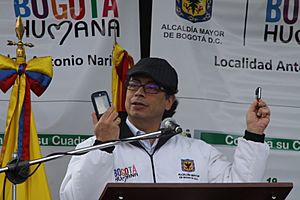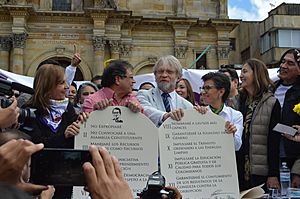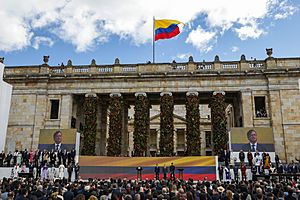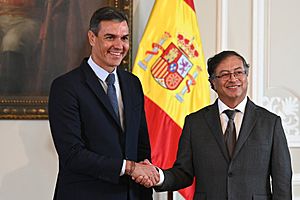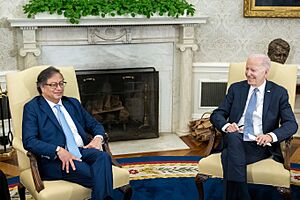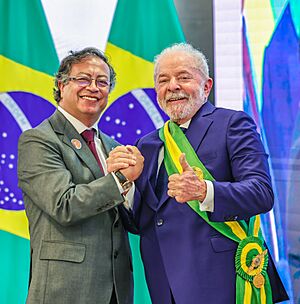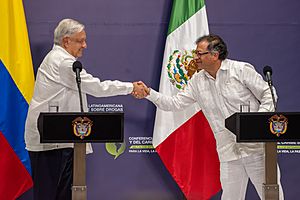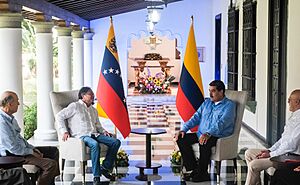Gustavo Petro facts for kids
Quick facts for kids
His Excellency
Gustavo Petro
ODB ODSC OYC
|
|
|---|---|
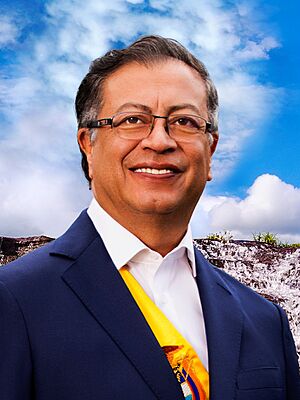
Official portrait, 2022
|
|
| 35th President of Colombia | |
| Assumed office 7 August 2022 |
|
| Vice President | Francia Márquez |
| Preceded by | Iván Duque |
| Senator of Colombia | |
| In office 20 July 2018 – 20 July 2022 |
|
| In office 20 July 2006 – 20 July 2010 |
|
| Mayor of Bogotá | |
| In office 23 April 2014 – 31 December 2015 |
|
| Preceded by | María Mercedes Maldonado (acting) |
| Succeeded by | Enrique Peñalosa |
| In office 1 January 2012 – 19 March 2014 |
|
| Preceded by | Clara López (acting) |
| Succeeded by | Rafael Pardo (acting) |
| Member of the Chamber of Representatives |
|
| In office 20 July 1998 – 20 July 2006 |
|
| Constituency | Capital District |
| In office 1 December 1991 – 20 July 1994 |
|
| Constituency | Cundinamarca |
| President pro tempore of the Community of Latin American and Caribbean States | |
| Assumed office 9 April 2025 |
|
| Preceded by | Xiomara Castro |
| Personal details | |
| Born |
Gustavo Francisco Petro Urrego
19 April 1960 Ciénaga de Oro, Córdoba, Colombia |
| Citizenship |
|
| Political party | Humane Colombia (2011–present) |
| Other political affiliations |
M-19 Democratic Alliance (1990–1997) Alternative Way (1998–2002) Regional Integration Movement (2002–2005) Alternative Democratic Pole (2005–2010) Historic Pact for Colombia (2011–present) |
| Spouses |
Katia Burgos
(m. 1986; div. 1992)Mary Luz Herrán
(m. 1992; div. 2000)Verónica Alcocer
(m. 2000) |
| Children | 6, including Nicolás and Sofía |
| Alma mater | Externado University of Colombia (A.B.) |
| Signature | |
Gustavo Francisco Petro Urrego (born April 19, 1960) is a Colombian politician and the 35th president of Colombia, who took office in 2022. He is known for being the country's first left-wing president in modern times. A left-wing leader often focuses on social equality and government support for citizens.
When he was young, Petro was part of a group called the 19th of April Movement (M-19). This group was originally in conflict with the government but later became a political party. Before becoming president, Petro served as a senator, a member of the Chamber of Representatives, and as the mayor of Bogotá, Colombia's capital city.
Contents
Early Life and Education
Gustavo Petro was born on April 19, 1960, in Ciénaga de Oro, a town in the Córdoba region of Colombia. His parents were Gustavo Petro Sierra and Clara Nubia Urrego. Part of his family background is Italian, which gives him both Colombian and Italian citizenship.
His family moved to the town of Zipaquirá when he was a teenager, looking for better opportunities. Petro studied economics at the Externado University of Colombia. He later continued his studies in other countries like Belgium and Spain.
Joining the M-19 Movement
When he was 17, Petro joined a group called the 19th of April Movement, also known as M-19. At the time, M-19 was an armed group that was against the government. They believed this was a way to bring political and economic change to Colombia.
During his time with M-19, Petro became a leader in his community and was elected as a councilman in Zipaquirá. In 1985, he was arrested for his involvement with the group and spent 18 months in prison. After this experience, he began to believe that peaceful politics, not armed conflict, was the best way to make a difference. Soon after, the M-19 movement began peace talks with the government and eventually became a political party.
A Career in Politics
From Activist to Congressman
After the M-19 group made peace with the government, its members formed a political party called the M-19 Democratic Alliance. Petro was elected to Colombia's Chamber of Representatives in 1991. This is part of Colombia's Congress, similar to the House of Representatives in the United States.
He later founded another political movement called Vía Alterna. As a representative, he became known for speaking out against corruption. In 2006, Petro was elected to the Senate of Colombia. He continued to be a strong voice against corruption and illegal activities in politics. Because of his work, he sometimes received threats against his safety.
Mayor of Bogotá
In 2011, Gustavo Petro was elected mayor of Bogotá, the capital city of Colombia. His government program, called Bogotá Humana (Humane Bogotá), focused on helping the poor, protecting the environment, and fighting corruption.
As mayor, he started several important projects:
- He worked to reduce crime in the city.
- He created programs to help people in poverty and improve public services like health and education.
- He focused on environmental issues, such as protecting the city's wetlands and planting thousands of trees.
- He improved the city's public transportation system.
- He also made the decision to ban bullfighting in the city's main bullring.
A Political Challenge
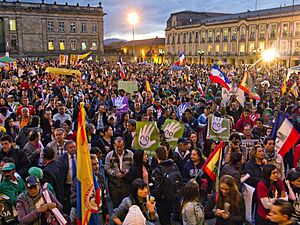
During his time as mayor, some political opponents disagreed with his changes. They organized a process to remove him from office. In 2013, he was temporarily removed. However, many people supported him, and after a legal review, he was returned to his position as mayor in April 2014. He served the rest of his term until 2015.
Path to the Presidency
After serving as mayor, Petro decided to run for president of Colombia. He ran in the 2018 presidential election and came in second place. He did not give up and decided to run again in 2022.
For the 2022 presidential election, his campaign focused on several key ideas:
- Protecting the environment: He wanted to move Colombia away from using fossil fuels like oil and coal and toward clean energy sources like solar and wind power.
- Fighting inequality: He promised to create programs to help the poorest people in Colombia and reduce the gap between the rich and the poor.
- Peace: He wanted to continue working toward peace in a country that has faced conflict for many years.
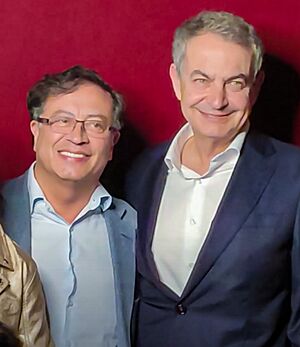
His running mate for vice president was Francia Márquez, an environmental activist. On June 19, 2022, Gustavo Petro won the election and became the new president of Colombia.
Presidency of Colombia (2022–Present)
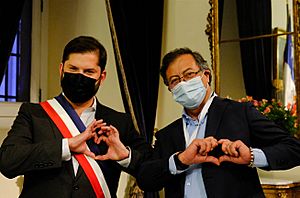
Gustavo Petro officially became president on August 7, 2022. As president, he has focused on his campaign promises of "total peace," social justice, and environmental protection.
Key Policies and Actions
- Environmental Protection: One of his first actions was to get the Senate to approve the Escazú Agreement, an important treaty to protect the environment in Latin America. His government has worked to reduce deforestation in the Amazon rainforest, with studies showing a significant drop in tree loss.
- Agrarian Reform: Petro started a program to give more land to small farmers. In Colombia, a small number of people own most of the farmland. This reform aims to make land ownership fairer and help poor families in the countryside.
- Peace Talks: He restarted peace negotiations with armed groups like the National Liberation Army (ELN) to try and end the long-running conflicts in Colombia.
- Foreign Relations: Petro worked to improve relationships with other countries. He re-established diplomatic ties with neighboring Venezuela. He has also met with world leaders like U.S. President Joe Biden and Spanish Prime Minister Pedro Sánchez.
International Views
President Petro is known for his strong speeches at the United Nations. He often talks about the need to fight climate change and has called the war on drugs a failure. He believes the world should focus on protecting nature, like the Amazon rainforest.
He has also been a vocal supporter of the Palestinian people and has called for peace in the Middle East.
In early 2025, there was a disagreement between Colombia and the United States over policies for returning Colombian citizens from the U.S. After discussions, the two governments reached an agreement to resolve the issue peacefully.
Personal Life
Gustavo Petro is married to Verónica Alcocer. Together, they have two daughters, Sofía and Antonella. Petro also has several other children from previous relationships: Nicolás, Andreá, and Andrés. He also adopted his wife's son from a previous relationship, who is also named Nicolás.
Awards and Honors
- 2006: Best representative, by the Chamber of Representatives, and Character of the year, by the readers of the newspaper El Tiempo.
- 2007: Letelier-Moffitt Human Rights Award, by the Institute for Policy Studies (IPS).
- 2011: Luis Carlos Galán Sarmiento Medal, by the Senate of the Republic and Chamber of Representatives Ethics Committees.
- 2013: Defenzoor of the year, by Defenzoores Association, and City Climate Leadership Award, by C40 and Siemens.
- 2018: Honorary Professor, by the National University of Lanús.
- 2022: Grand Collar of the Order of Boyacá, Collar of the Order of San Carlos, Grand Cross Extraordinary of the National Order of Merit and Order of Merit Colonel Guillermo Fergusson, by president Iván Duque.
- 2023: Grand Collar of the Order of Isabella the Catholic, Doctor Honoris Causa, by the University for Peace.
- 2024: Grand Collar of the Order of the State of Palestine, Mahmoud Abbas.
See also
 In Spanish: Gustavo Petro para niños
In Spanish: Gustavo Petro para niños


